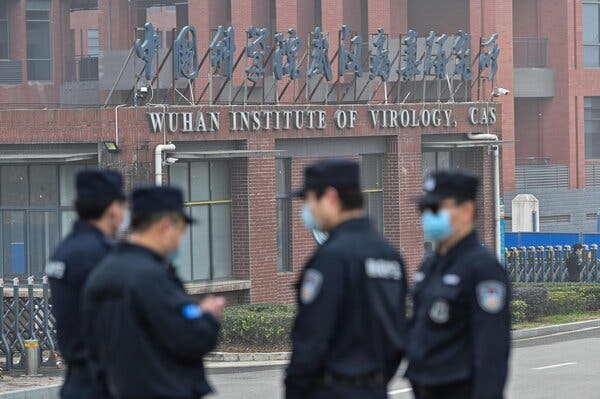
The director of national intelligence delivered a report to President Biden on Tuesday on the origins of the coronavirus epidemic, according to U.S. officials, but the nation’s spy agencies have not yet concluded whether the disease was the result of an accidental leak from a lab or if it emerged naturally in a spillover from animals to humans.
Mr. Biden had ordered the nation’s intelligence agencies three months ago to draft a report on the origins of the virus, which has been the subject of an intensifying debate, in part to give the agencies a chance to examine a trove of data that had not been fully exploited.
But the inquiry, which examined data collected from a virology research institute in Wuhan, China, the city where the virus first spread, has yet to answer the biggest outstanding question about where it came from. Its absence of conclusions underscores the difficulty of pinpointing the source of the virus, particularly given China’s refusal to continue to cooperate with international investigations into the origin the coronavirus.
In the months after the pandemic began, intelligence agencies began looking into how it started. Former Secretary of State Mike Pompeo pushed the agencies to look into the theory that the virus was created inside a Chinese lab and accidentally leaked. Mr. Pompeo formed his own research group to study the question.
During the Trump administration, intelligence agencies ruled out theories that the virus was deliberately leaked. But they said they could not make a conclusion about what was more likely: an accidental leak from a lab researching coronaviruses or a natural development of the virus.
While many scientists were initially skeptical of the lab leak theory, at least some became more open to examining it this year. And some criticized a World Health Organization report in March that found the lab leak theory unlikely.
After that report, Biden administration officials became frustrated with a decision by the Chinese government to stop cooperating with further investigations by the World Health Organization into the origins of the pandemic. In the face of what they called Chinese intransigence and a divided American intelligence community, Biden administration officials then ordered a 90-day review of the intelligence, resulting in the report delivered to the president on Tuesday.
Current and former officials have repeatedly warned that finding the precise origins of the pandemic may be more of a job for scientists than spies. Under Avril D. Haines, the director of national intelligence, the agencies have stepped up cooperation with scientists, hoping to better understand the current pandemic and possible future ones.
Officials also warned that the 90-day review was probably too brief to draw any definitive conclusions.
The report remains classified for now, and officials would not discuss its findings. But officials said that Ms. Haines’s office would most likely declassify some information later this week.
“I can’t obviously speak to a classified briefing,” Jen Psaki, the White House press secretary, said when reporters asked her about the report on Wednesday. “I know you are eager to receive an unclassified summary, that is something the intelligence community has been working to produce and as soon as that is available it will be put out publicly.”
Asked whether the president would be satisfied if the inquiry ended inconclusively, Ms. Psaki said that he was doing everything possible to uncover the truth.
“I can assure you the president wants to get to the bottom of the root causes of Covid-19, that as you noted has killed hundreds of thousands of Americans, and wishes that there had been more done earlier on to get to the bottom of it, and to of course save more lives,” she said.
Daniel E. Slotnik contributed reporting.
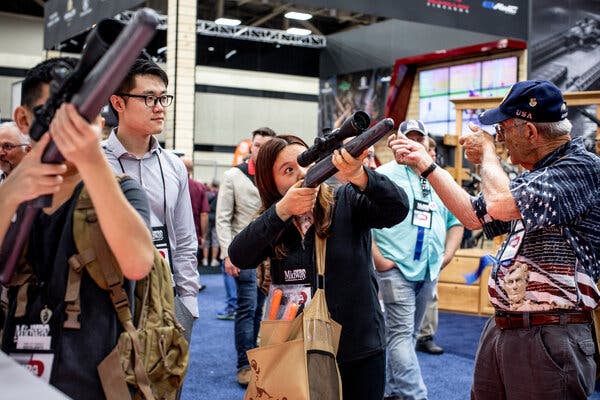
The National Rifle Association announced on Tuesday that it was canceling its annual meeting in Houston because of concerns over the rising number of Covid cases in the area, fueled by the Delta variant.
“The N.R.A.’s top priority is ensuring the health and well-being of our members, staff, sponsors and supporters,” the organization said in a statement. “We are mindful that N.R.A. Annual Meeting patrons will return home to family, friends and co-workers from all over the country, so any impacts from the virus could have broader implications.”
It is the second year in a row that the meeting has been canceled because of the pandemic.
The N.R.A. did not immediately respond to a request for comment on Tuesday night.
The meeting, which was scheduled for Sept. 3 to 5 and usually hosts thousands of people, was canceled after N.R.A. leaders consulted with medical professionals, local officials and sponsors, the group said.
Like most counties in Texas, Harris County, home to Houston, has had its hospitals overwhelmed as infections reach levels not seen since January. The state’s seven-day average death rate was 139 on Monday, compared with 34 on June 1, and hospitalizations in Harris County have rapidly climbed since July. Gov. Greg Abbott, who recently tested positive for the coronavirus, has prohibited mask and vaccination mandates.
The N.R.A. said it understood that its exhibitors and sponsors would be affected by the cancellation, but it planned to “support many other N.R.A. local events and smaller gatherings — in a manner that is protective of our members and celebrates our Second Amendment freedom.”
Cancellations of large meetings and conventions, such as the New York International Auto Show, which had been scheduled for late August, have recently ramped up across the country as the Delta variant continues to spread, largely among unvaccinated people.

Ohio State University announced on Tuesday that all students, faculty and staff would be required to be vaccinated against Covid-19 during the fall semester, becoming one of the first large state universities to issue a vaccine mandate that extends beyond students.
“The university is taking this step because vaccines are the safest and most effective form of protection against Covid-19,” Kristina M. Johnson, the president of the university, said in a statement on Tuesday. “This step will increase our ability to support our students in continuing their educational experiences as well as help protect our current and the state’s future work force.”
The decision from the university, which has more than 66,000 students and 30,000 employees, comes after the Food and Drug Administration granted full approval for the Pfizer-BioNTech coronavirus vaccine for those 16 and older. That’s given schools and companies room to announce similar mandates.
Louisiana State University said on Tuesday that all its students would have to either submit proof of vaccination or “be tested for Covid on a regular basis.” The University of Minnesota also issued a mandate for students to be vaccinated following the F.D.A.’s approval. And in New York, all in-person students in the state and city university systems are required to be vaccinated.
Staff, faculty and students at Ohio State University have until Oct. 15 to receive their first dose and until Nov. 15 for their second, Ms. Johnson said. More than 73 percent of the university’s community has received at least one shot, she added.
“A limited set of exemptions will be approved on a case-by-case basis,” Ms. Johnson said, adding that the Moderna and Johnson & Johnson vaccines, as well as others approved by the World Health Organization, would also meet the university’s vaccine requirement.
WBNS 10 reported that hundreds of people went to the Ohio Statehouse on Tuesday to voice support for a Republican-backed bill that would prohibit employers from requiring workers to be vaccinated.
transcript
transcript
Hochul Calls for Mask Mandate for New York Schools
On her first day in office, Gov. Kathy Hochul of New York said she would order a universal mask mandate in the state’s schools and push for Covid vaccine-or-test requirements for school employees.
-
None of us want a rerun of last year’s horrors with Covid-19. Therefore, we will take proactive steps to prevent that from happening. Priority No. 1: We get children back to school, and protect the environment so they can learn and everyone is safe. For months, I’ve been consulting with parents, elected officials, teachers, school boards and superintendents. As a result, we need to require vaccinations for all school personnel with an option to test out weekly, at least for now. To accomplish this in New York, we need partnerships with all levels of government, and I’m working now on getting this done. New York is launching a back-to-school Covid-19 testing program to make testing for students and staff widely available and convenient. I’m also directing the Department of Health to institute universal masking for anyone entering our schools. Later this week, I’ll announce a series of school-related policies — they’ll be concise and consistent, giving the school districts what they have been asking for. Which leads me to Priority No. 2: increased vaccination rates for New Yorkers. Now much progress has been made, but too many are yet not vaccinated, putting themselves and their communities at risk. With the F.D.A.’S full approval of the Pfizer vaccine yesterday, New Yorkers can expect new vaccine requirements, and more on that soon. Priority No. 3: Prepare for booster shots, and make sure they are available and distributed quickly and reliably.
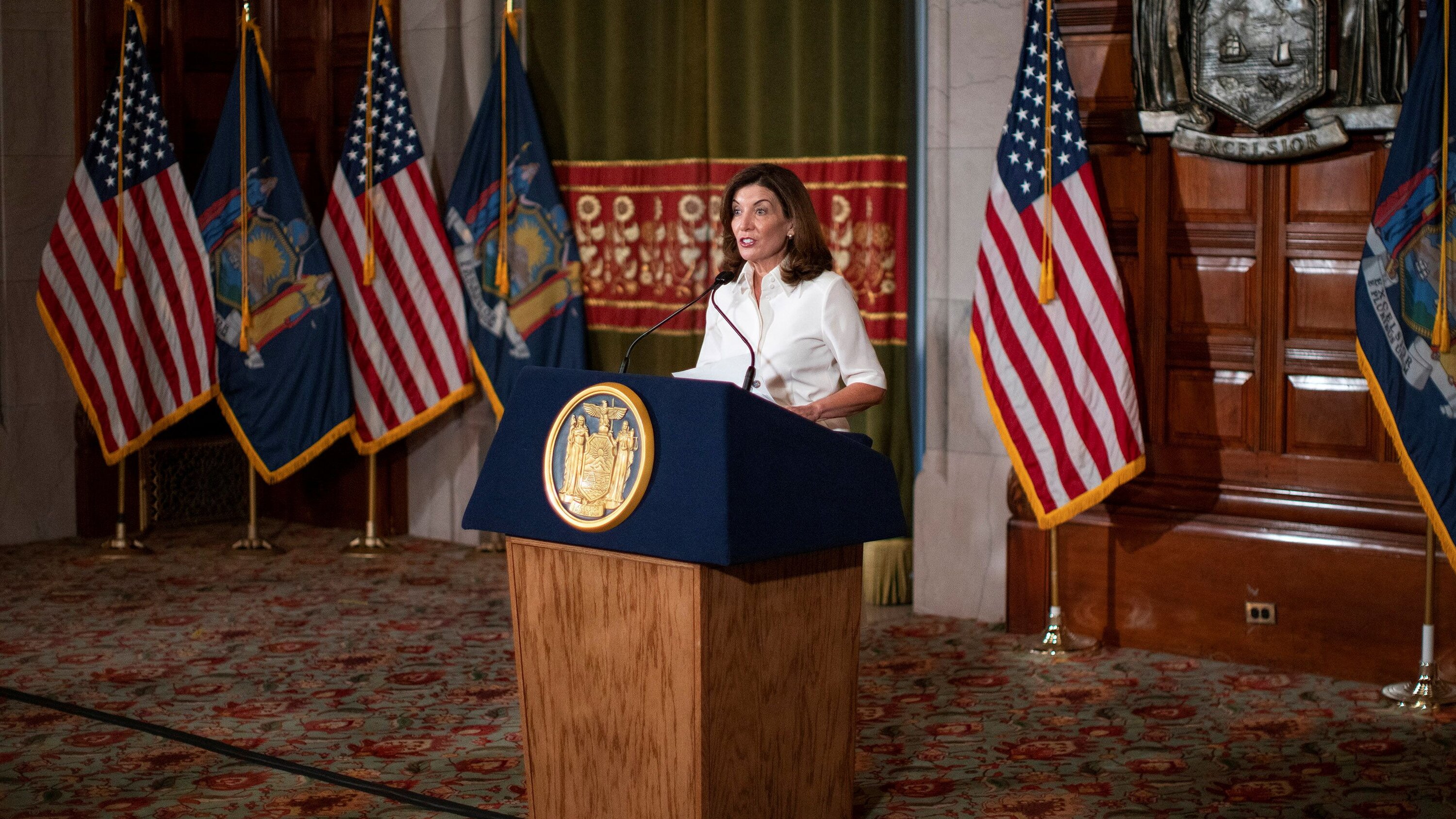
Gov. Kathy Hochul, in her first day as governor of New York State, called on state health officials to impose a universal mask mandate in public and private schools and said she wanted to institute Covid vaccine-or-test mandates for employees in schools.
Ms. Hochul stopped short of formally implementing either requirement. In a televised address, she said that she was ordering the state Health Department to institute the mask requirement and would partner with “all levels of government” to implement a vaccine order.
“I’m working now on getting this done,” she said.
But in her first remarks to the public as governor, Ms. Hochul said that her top priority as she took office was ensuring that children could safely return to in-person learning as the Delta variant of the coronavirus spreads across the state.
“Priority No. 1: We get children back to school and protect the environment, so they can learn and everyone is safe,” Ms. Hochul said.
The governor’s announcement came a day after Mayor Bill de Blasio announced that New York City would require all employees of the city’s Department of Education to receive at least one dose of a coronavirus vaccine by Sept. 27. The city requirement will apply to almost every adult working inside public school buildings, including the teachers and principals in the city’s public school system, the nation’s largest.
The mandate was expected to be a signal of more to come around the country, particularly after the Food and Drug Administration’s approval of the Pfizer-BioNTech vaccine for those 16 and older on Monday.
New York would join a growing number of states, mostly led by Democrats, that are requiring proof of vaccines for teachers, or in some cases forcing them to conduct regular testing.
Gov. Philip D. Murphy of New Jersey said on Monday that all teachers in that state would have to either be vaccinated or submit to weekly testing. California and Hawaii have a similar mandate in place.
The cities of Los Angeles and Chicago, as well as Washington State and Oregon, have also recently announced full vaccine mandates for teachers. The Centers for Disease Control and Prevention has recommended masking for everyone in schools, regardless of vaccination status. Several states, including California and Connecticut, currently have school mask mandates in place.
Ms. Hochul said that she would move toward requiring “vaccinations for all school personnel, with an option to test out weekly at least for now.” She added that New Yorkers could “expect new vaccine requirements” in light of the F.D.A.’s approval of the Pfizer vaccine.
The mask mandate would be one of Ms. Hochul’s first acts as governor, a position she takes as the state faces a climb in virus cases. Her predecessor, Andrew M. Cuomo, led New York through its first wave of the pandemic, often exerting a heavy hand that local officials bristled at as he set and lifted restrictions on businesses.
Even as cases, hospitalizations and virus-related deaths have been rising recently in the state, they remain well below the peak of the pandemic in April 2020 and a subsequent spike last winter.
Before Ms. Hochul was sworn in, Mr. Cuomo, who resigned on Monday amid a swirl of sexual harassment allegations and an accelerating impeachment investigation, voiced support for vaccination mandates for teachers.
In his farewell address, Mr. Cuomo spoke more forcefully, saying he believed that teachers “must be vaccinated for their protection and for our children’s protection.” But he said a state law would probably be required, especially given the heated political debate around vaccination.
New York State United Teachers, a statewide teachers’ union, said in a statement on Tuesday that it supported a state mask mandate. Though the union has previously expressed opposition to full vaccine mandates on school employees, it said it welcomed Ms. Hochul’s push to require regular testing for unvaccinated staff.
In New York City, Mr. de Blasio’s vaccination push has largely been supported by educators and the city’s teachers’ union, the United Federation of Teachers. City officials are negotiating with the U.F.T. and other unions who represent education staff over what might happen to employees who do not comply with the mandate.
District Council 37, which represents classroom aides, cafeteria workers and other school employees, said that it would file a formal complaint over the city’s vaccine mandate.
Last month, Mr. de Blasio issued a mandate for all municipal workers that allowed those who were unvaccinated to opt for weekly testing. That option remains for city employees who do not work in schools.
Mr. Cuomo said on Aug. 16 that all health care workers in New York State, including employees at hospitals, nursing homes, adult care facilities and other congregate care settings, would be required to get at least one dose of coronavirus vaccine by Sept. 27.
Ms. Hochul said that the state would use federal funds to launch a “back to school” testing program that would help make testing for students and staff easily accessible. Tests will be made available in schools and at Rite Aid pharmacy locations.
She also said New York officials would consider reopening mass vaccination sites to help provide booster shots that the Biden administration recommended vaccinated American adults begin getting starting late next month, assuming federal regulators clear them.
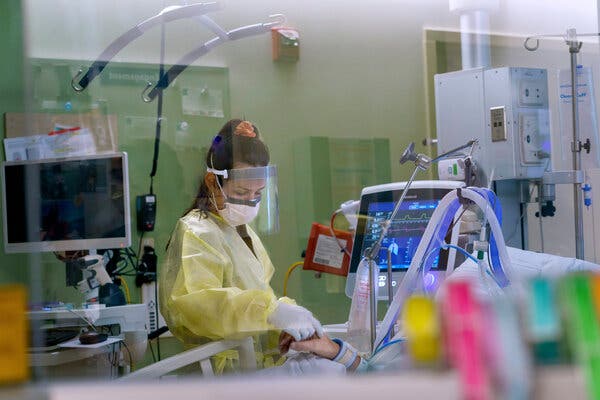
Oregon is restoring a statewide mask mandate, ordering both vaccinated and unvaccinated people to wear masks when gathering indoors or out.
Gov. Kate Brown, a Democrat, said on Tuesday that masks — which will be required starting on Friday — were needed to fight rising coronavirus cases fueled by the Delta variant. She called face coverings a simple yet critical tool to help keep Oregonians safe.
“The Delta variant is much more contagious than previous variants we’ve seen, and it has dramatically increased the amount of virus in our communities,” Ms. Brown said in a statement. “Masks have proven to be effective at bringing case counts down, and are a necessary measure right now, even in some outdoor settings, to help fight Covid and protect one another.”
Oregon is the first state to reintroduce an outdoor mask mandate for both vaccinated and unvaccinated people since the Delta-driven surge took hold in the early summer, and among a handful to reimpose an indoor mask requirement statewide.
In California, Los Angeles County announced earlier this month that it would require masks to be worn at large outdoor concerts and sporting events that attract more than 10,000 people.
Under Oregon’s new rule, masks will be required in most public outdoor settings, including large outdoor events, when physical distancing is not possible. The rule does not apply to fleeting encounters, like passing someone on a hiking trail.
Though masks will not be required for outdoor gatherings at private residences, Oregon health officials recommended face coverings in those settings when they include people from different households.
While more than half of Oregon residents are fully vaccinated, new cases have surged in the state to a daily average of 2,114 as of Tuesday, from 339 a month ago, according to a New York Times database. Hospitalizations have more than quadrupled in the past month, to an average of more than 940 patients.
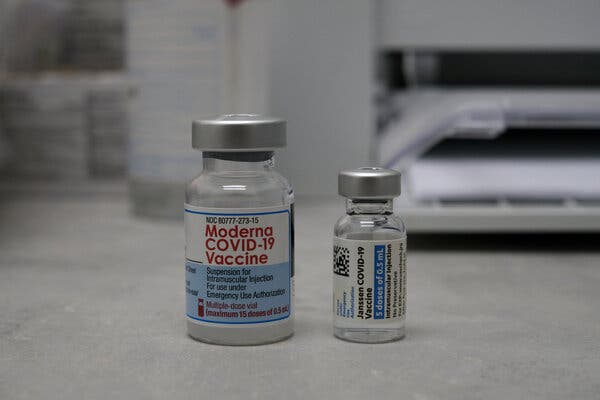
Now that the Pfizer-BioNTech coronavirus vaccine has been given full federal approval for use in people 16 and older, attention is turning to the vaccines made by Moderna and Johnson & Johnson.
Both vaccines have been available to the American public for months under emergency use authorizations from the Food and Drug Administration. Moderna applied for full approval in June, a month after Pfizer, and Johnson & Johnson is expected to apply soon.
When they might be fully approved remains unclear. Dr. Peter Marks, the F.D.A.’s top vaccine regulator, declined to specify a timeline for Moderna’s approval in a call with reporters on Monday.
Dr. Marks did note that the approval for Pfizer’s vaccine took only 97 days from the time the company submitted its data, less than half the time of a typical approval period. The exhaustive process was expedited by a “tireless team” that “worked day and night to get this done,” he said, adding that regulators were “highly rigorous” despite the short timeline.
Dr. Anthony S. Fauci, the nation’s top infectious disease expert, said in a series of interviews on Tuesday that he hoped the F.D.A. would soon be able to move forward to give full approval to the next vaccine.
“I don’t think it’s too far away,” Dr. Fauci said on the CBS program “This Morning.”
“I think it’s a temporal issue,” he continued. “I don’t think there’s anything different necessarily about the process, it’s just that they submitted or are submitting their material a bit later or after Pfizer did.”
Full federal approval could make vaccines more palatable to the more than 80 million people around the country who have not been vaccinated yet, Dr. Fauci said on “Morning Joe” on MSNBC, citing a survey that found that about a third of them were waiting for the F.D.A.’s imprimatur before getting a shot.
Dr. Fauci also said that he thought advertising for the vaccine, which is allowed now that it has been approved, might increase uptake, and that approval would spur more vaccine mandates from businesses, colleges and local governments.
President Biden encouraged such mandates in an address on Monday. The Pentagon announced that it would require all 1.4 million active duty troops to be vaccinated, New Jersey said that all teachers would need to get shots or weekly testing, and the State University of New York announced a vaccination requirement for its students.
Vaccine mandates and other protective measures have taken on greater urgency as the extremely infectious Delta variant has driven a surge in cases nationwide and overwhelmed hospitals in many states. The seven-day average of known deaths connected to the coronavirus has risen above 1,000 for the first time since March 2021, according to data collected by The New York Times.
Starting Sept. 20, the federal government plans to provide booster shots for people eight months after their second vaccine doses, assuming federal regulators clear extra doses.
Nearly 65 million people have been vaccinated with Moderna’s shot, and nearly 14 million with Johnson & Johnson’s, compared with more than 92 million people who have been vaccinated with Pfizer’s, according to data from the Centers for Disease Control and Prevention. Just over 60 percent of people eligible for the vaccine in the United States have been fully vaccinated.
Children ages 12 to 15 can still get Pfizer’s vaccine under the emergency use authorization; none of the vaccines have been authorized for children younger than 12.
In July, federal regulators pressed both Pfizer and Moderna to expand the sizes of trials in children ages 5 to 11 to detect rare side effects, including heart inflammation problems that have turned up in people younger than 30. Pfizer appeared to be on a faster track to secure an emergency use authorization for young children at the time.
Dr. Fauci said that pharmaceutical companies and federal agencies were still collecting data on using the vaccines in children younger than 12, and that he hoped the F.D.A. could at least authorize the vaccines for emergency use in children by early winter.
Speaking on “The Today Show” on NBC, Dr. Fauci said he thought that ending the pandemic in the United States would involve convincing the “overwhelming majority” of unvaccinated people to be inoculated.
“I believe we can see light at the end of the tunnel,” Dr. Fauci said. “When we reach a point where there’s enough of a veil of protection over the community that you see a dramatic diminution not only in cases, but in hospitalizations and, ultimately of course, in deaths.”
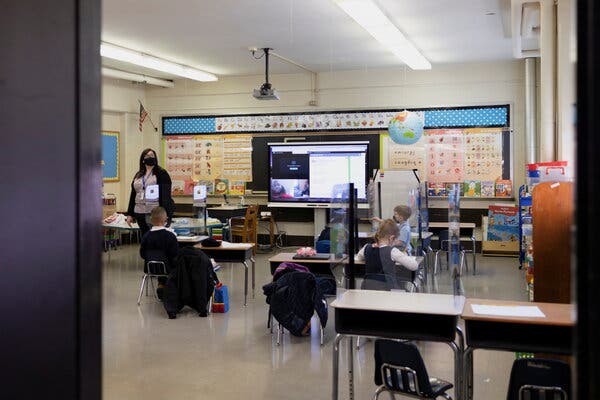
The school board in Philadelphia approved a resolution on Tuesday to mandate Covid-19 vaccinations for all its school district employees, joining a number of other school districts across the country.
“It is the board’s duty to protect the health and safety of our children, many of whom cannot get vaccinated, and being vaccinated is the best protection against the virus,” said Joyce S. Wilkerson, the school board president. “We believe that preventing Covid-19 infections through vaccines will lead to fewer missed school days, more in-person learning days, and ultimately, to improved student achievement.”
The resolution, which will affect more than 20,000 people, was approved unanimously by the board at the Tuesday night meeting, but a vaccination deadline was not set.
Jerry Jordan, the president of the Philadelphia Federation of Teachers, said in a statement that “this union has been very clear from the start — we support vaccines, and we have been urging every member to get vaccinated.”
Los Angeles and Chicago, the second- and third-largest districts in the nation, recently announced that educators and school staff would have to be fully vaccinated by Oct. 15. New York City Mayor Bill de Blasio announced on Monday that all Department of Education employees must have received at least one dose of a coronavirus vaccine by Sept. 27.
California and Illinois are also both requiring everyone to use masks inside schools when they reopen. And in defiance of Gov. Ron DeSantis’s ban on mask mandates, the Broward County School Board in Florida imposed a mask mandate earlier this month for students, staff members and visitors.
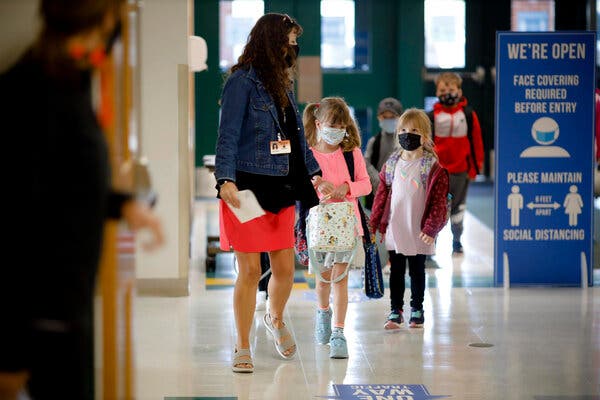
Massachusetts is preparing to introduce a mask mandate for the state’s public schools as early as Wednesday, in a reversal for Gov. Charlie Baker, who has vocally advocated for local control of school masking policy.
Mr. Baker, a Republican in a deeply Democratic state, had come under pressure to make masks mandatory in schools, and a poll released last week suggested that 81 percent of Massachusetts voters support the idea.
The state education board on Tuesday voted 9 to 1 to give the education commissioner, Jeffrey Riley, the power to issue a mandate. Mr. Riley is expected to issue the mandate this week, establishing uniform requirements ahead of school openings.
Massachusetts has not joined the list of states — including New Jersey, Oregon and Washington — that require teachers to get the vaccine. According to a New York Times data tracker, 75 percent of Massachusetts’s population has received at least one dose, a higher rate than any state except Vermont.
Under the current plan, nearly all public school students over age 5, regardless of vaccination status, will be expected to wear masks inside Massachusetts school buildings until at least October, when state officials will allow individual schools to lift the mandate as long as 80 percent of staff and students are vaccinated. Unvaccinated people would be required to continue wearing masks.
Merrie Najimy, president of the Massachusetts Teachers Association, called the vote “a significant advancement toward keeping our communities safe.” The union, the state’s largest, voted on Aug. 1 in favor of a mask mandate in schools.
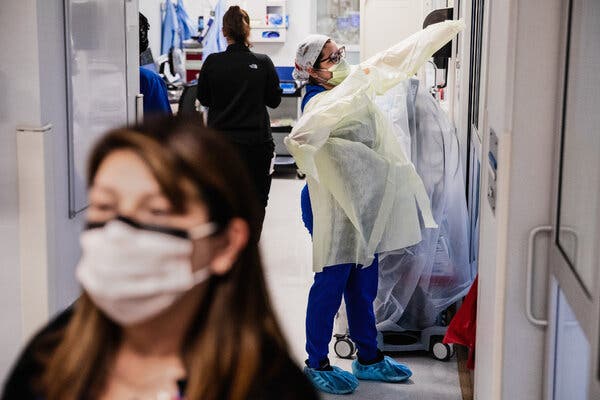
Coronavirus vaccines provided strong protection against infection for essential workers earlier this year, but became less effective as the highly contagious Delta variant became the dominant form of the virus, according to a study published on Tuesday by federal health officials.
It was not clear whether the decline in protection was caused by the emergence of the Delta variant or the lengthening period of time since the inoculations were begun. Vaccine effectiveness showed possible signs of decline starting four months after vaccinations were first rolled out.
“What we were trying to figure out is: Is this Delta, or is this waning effectiveness?” said Ashley Fowlkes, an epidemiologist on the Covid-19 response team at the Centers for Disease Control and Prevention, and the study’s lead author. “Our conclusion is that we can’t really tell.”
Researchers followed thousands of first responders, health care workers and others who could not work remotely in eight locations in Arizona, Florida, Oregon, Texas, Utah and Minnesota. The participants were tested for coronavirus infection every week for 35 weeks, as well as any time they developed Covid-like symptoms.
Most of the vaccinated workers received the Pfizer-BioNTech vaccine; one-third received the Moderna vaccine and 2 percent the Johnson & Johnson vaccine.
Overall, the vaccines reduced infections among vaccinated workers by 80 percent from Dec. 14, when the U.S. vaccination campaign began, to Aug. 14, compared with unvaccinated workers. (The results were adjusted for factors including occupation, demographic characteristics, frequency of close social contact and mask use.)
But while the shots reduced infections by 91 percent before the emergence of the Delta variant, their protectiveness dropped to 66 percent as the variant became dominant in each region.
“We really wanted to let people know that we were seeing a decline in the effectiveness of the vaccine in protection against any infection, symptomatic or asymptomatic, since the Delta variant became dominant,” Dr. Fowlkes said.
“But we also want to reinforce that 66 percent effectiveness is a really high number,” she added. “It’s not 91 percent, but it is still a two-thirds reduction in the risk of infection among vaccinated participants.”
The drop-off in effectiveness “should be interpreted with caution,” however, because the observation period during which Delta was dominant was short, Dr. Fowlkes said, and the overall number of infections was small.
Another C.D.C. study released on Tuesday analyzed infections and hospitalizations in Los Angeles County from May 1 to July 25 of this year. While vaccinated people did become infected, the researchers concluded that among the unvaccinated, infection rates were 4.9 times as high, and the hospitalization rate was 29 times as high.
Of 43,127 known infections in Los Angeles County among residents 16 and older, 25 percent were in fully vaccinated people, 3.3 percent in partly vaccinated people and 71.4 percent in unvaccinated people. (The proportion of fully vaccinated Los Angeles County residents increased to 51 percent on July 25, from 27 percent on May 1.)
Three percent of vaccinated individuals were hospitalized, 0.5 percent were admitted to intensive care units, and 0.2 percent required mechanical ventilation. The comparable rates for unvaccinated individuals were 7.6 percent, 1.5 percent and 0.5 percent, the study reported.
Those who were hospitalized despite vaccination were also older, on average, than the unvaccinated who were hospitalized. The death rate among the vaccinated was lower: 0.2 percent, compared with 0.6 percent among the unvaccinated. The median age at death was also higher among the vaccinated, at 78, compared with a median age of 63 among the unvaccinated.
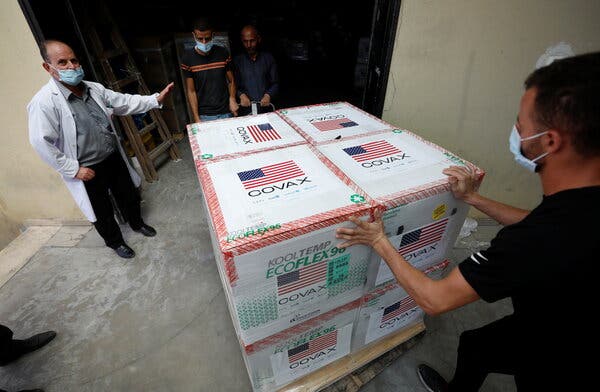
For months, the Palestinian Authority struggled to inoculate many residents of the West Bank for want of vaccine supplies.
Now the government has a large quantity of doses in its stockpile, but it lacks something else: enough recipients.
“We’ve got vaccines, but we urgently need people to get vaccinated,” said Shadi al-Liham, the top health ministry official in the Bethlehem district.
As of Tuesday, about 35 percent of West Bank residents had received at least one dose of vaccine and about 22 percent were fully vaccinated, according to data from the health ministry. By contrast, Israel has fully vaccinated about 60 percent of its population and is now administering booster shots to vulnerable people.
Several Palestinian officials declined to say exactly how many vaccine doses the ministry had on hand. But they noted that a shipment of 500,000 doses from the United States government had arrived on Tuesday by way of the Covax global vaccine-sharing initiative, with 300,000 intended for the West Bank and 200,000 for the Gaza Strip.
The Palestinian Authority is now facing a challenge familiar to many governments around the world: trying to persuade a skeptical segment of society to get vaccinated.
Health officials said they hoped the vaccine drive would gather steam, especially after the authority’s cabinet decided on Monday that public-sector employees who do not get vaccinated would be placed on unpaid leave until the end of the pandemic.
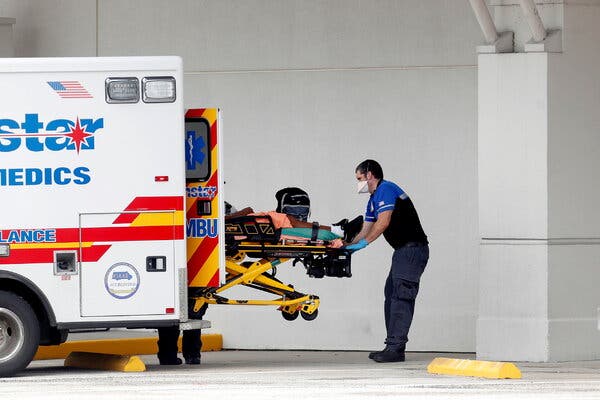
More people in Florida are catching the coronavirus, being hospitalized and dying of Covid-19 now than at any previous point in the pandemic, underscoring the perils of limiting public health measures as the Delta variant rips through the state.
This week, 227 virus deaths were being reported each day in Florida, on average, as of Tuesday, a record for the state and by far the most in the United States right now. The average for new known cases reached 23,314 a day on the weekend, 30 percent higher than the state’s previous peak in January, according to a New York Times database. Across the country, new deaths have climbed to more than 1,000 a day, on average.
And hospitalizations in Florida have almost tripled in the past month, according to federal data, stretching many hospitals to the breaking point. The surge prompted the mayor of Orlando to ask residents to conserve water to limit the strain on the city’s supply of liquid oxygen, which is needed both to purify drinking water and to treat Covid-19 patients.
Even as cases continue to surge, with more than 17,200 people hospitalized with the virus across Florida, Gov. Ron DeSantis, a Republican, has held firm on banning vaccine and mask mandates. Several school districts have gone ahead with mask mandates anyway.
Overall, 52 percent of Floridians are fully vaccinated, but the figure is less than 30 percent in some of the state’s hardest-hit counties.
On Monday, dozens of doctors and hospital employees in Palm Beach County gathered for an early morning news conference to beseech the unvaccinated to get shots, emphasizing that the surge was overwhelming the health care system and destroying lives.
“We are exhausted,” said Dr. Rupesh Dharia, an internal medicine specialist. “Our patience and resources are running low.”
A growing proportion of the people inundating hospitals and dying in Florida now are coming from younger segments of the population, particularly those ages 40 to 59, which were less vulnerable in earlier waves of the pandemic. The Delta variant is spreading among younger people, many who thought they were healthy and did not get vaccinated.
Dr. Chirag Patel, the assistant chief medical officer of UF Health Jacksonville, a hospital system in Northeast Florida, said the patients hospitalized with the virus during this latest surge tended to be younger and had fewer other health issues, but were nearly all unvaccinated. Of those who have died, including patients ranging in age from their 20s to their 40s, more than 90 percent were not inoculated, Dr. Patel said.
“We’ve had more patients this time around that have passed away at a younger age with very few if any medical problems,” he said. “They simply come in with Covid, and they don’t make it out of the hospital.”
Two months ago, the number of Covid-19 patients admitted at the system’s two University of Florida hospitals in Jacksonville was down to 14. On Tuesday morning, 188 coronavirus patients were in the hospitals, including 56 in the intensive care units.
One of the hardest parts of his job, Dr. Patel said, is having to tell family members that their unvaccinated loved one had succumbed to the virus. “It’s just such a senseless and preventable way of ultimately dying,” he said.
Lisa Waananen, Alison Saldanha and Sarah Cahalan contributed reporting.
Global roundup

Indonesia, where cases of the coronavirus surged last month, will gradually ease restrictions in the capital, Jakarta, and elsewhere as reports of new cases decline.
Places of worship and restaurants will be allowed to operate at 25 percent of their capacity, while shopping centers may stay open until 8 p.m. at up to 50 percent of their capacity, President Joko Widodo said.
On Tuesday, restaurants, malls and places of worship were set to reopen in the densely populated island of Java, which includes Jakarta and has a population of about 140 million, and Bali, a popular resort island, as well as other regions.
Cases in Indonesia peaked in mid-July but have since declined by 78 percent, Mr. Widoo said at a virtual news briefing on Monday. He added that the number of people recovering from the virus is now higher than the number of people testing positive for it.
But while the government’s official tally shows a drop in cases, the World Health Organization warned that the data might be inaccurate because the rate of testing has also slowed.
“Urgent action is needed to address the continuing surge of cases,” the W.H.O. said in a statement released last week, noting continued outbreaks in parts of Indonesia.
On average, more than 1,000 people in Indonesia continue to die every day from the virus, down from around 1,500 a day in early August. So far, just 12 percent of the population is fully vaccinated, according to data from the Our World in Data project at the University of Oxford.
In other news from around the world:
-
The Philippines’ largest public hospital has been so overwhelmed by a continuous stream of coronavirus patients that it temporarily stopped accepting patients at its emergency room on Tuesday. The Philippine General Hospital’s decision came a day after the health department reported 18,332 new cases on Monday, a new daily high for the country.
-
After a drop in 2020, the number of student visas granted by the U.S. to international students has recovered to prepandemic levels, according to data from the U.S. State Department.
Eduardo Medina contributed reporting.

Goldman Sachs told employees on Tuesday that it will require anyone who enters the bank’s U.S. offices, including clients, to be fully vaccinated starting on Sept. 7, making it the most prominent Wall Street bank to issue such a broad requirement.
The announcement, in a memo obtained by The New York Times, came a day after the Food and Drug Administration gave full approval for the Pfizer-BioNTech vaccine, a move that many large corporations had been seeking before making mandates.
President Biden seized on the F.D.A.’s approval, urging private businesses to protect their workers through vaccinations.
“If you’re a business leader, a nonprofit leader, a state or local leader, who has been waiting for full F.D.A. approval to require vaccinations, I call on you now to do that,” the president said on Monday. “Require it.”
Companies have been consulting with advisers for months about whether to mandate vaccines, but have been wary of employee pushback and potential litigation. The quick spread of the highly contagious Delta variant and prominent first moves by large corporations like Walmart and the Walt Disney Company helped to expedite those talks. Now, the F.D.A. approval on Monday has finally given them some assurances they need to move forward.
Goldman Sachs told employees on Tuesday that anyone in the United States who is not fully vaccinated by Sept. 7 must work from home. It will also require fully vaccinated employees to undergo weekly coronavirus testing.
The bank, which employs roughly 20,000 in the United States, is reinstating mask requirements throughout office common areas as of Wednesday. At offices in San Francisco and Washington, masks will be required at all times, except while someone is eating or drinking.
Other Wall Street banks have similar requirements. Citigroup said this month that it would require vaccinations for employees returning to its corporate offices in the New York area this fall, and Morgan Stanley said in June that it would require all employees and visitors to its New York offices to be vaccinated. JPMorgan Chase has so far strongly encouraged, but not required, vaccinations for its work force.
The Goldman Sachs announcement followed several others this week. On Monday, Chevron said it was mandating vaccines for expats and employees who travel internationally, as well as for the offshore work force in the Gulf of Mexico and for some onshore support personnel. CVS Health said its pharmacists have until Nov. 30 to be fully vaccinated, while others who interact with patients, and all corporate staff, have until Oct. 31. Disney Cruise Line said Tuesday that it was requiring passengers over 12 years old to be fully vaccinated for sailings to the Bahamas.
The F.D.A. approval also gives industry groups grounds to encourage vaccinations from their members — and lobby against legislation that may hinder those efforts. The U.S. Chamber of Commerce announced this month that it would mandate vaccines for its work force once the F.D.A. fully approved them. The Business Roundtable, an influential lobbying group, said Monday that it supported mandates.
“Many companies have made the decision to mandate vaccines for some or all of their employees, and we applaud their decision,” the group, led by the Walmart chief executive Doug McMillon, said in a statement. “We also encourage policymakers, including at the state and local levels, to support — not impede — companies’ ability to make such a decision.”
At least three states — Montana, Texas and Utah — that had banned vaccine requirements by law or executive order did so specifically because the three vaccines used in the United States were being administered under emergency-use authorizations, not full approval. Some companies, like Norwegian Cruise Line in Florida, have resisted such prohibitions, but most have largely stayed out of the fray so far.
Over the past month, there have been signs that companies are showing an increased appetite for vaccine mandates. Earlier this month, United Parcel Service said that any employee returning to an office that serves a support function must be fully vaccinated, or have received one shot with a second scheduled, by Oct. 1. The policy does not apply to workers in operational roles, though they are being encouraged to get vaccinated.
As of Aug. 7, the share of job postings requiring vaccinations was up 90 percent from a month earlier, according to the job search company Indeed. Those that require vaccinations, though, are still a small fraction of the overall listings.
F.D.A. authorization could also simplify negotiations with unions, whose mixed stance toward mandates has contributed to a class divide among workers. On Monday, Disney World said unions representing more than 30,000 employees had agreed to a mandate, citing the F.D.A.’s full approval, that would require workers to be vaccinated by Oct. 22.
But the United Food and Commercial Workers International, a union that represents around 1.3 million workers in grocery stores, pharmacies and meatpacking plants, warned on Monday against mandates that did not take employees’ concerns into consideration.
“With more employers considering vaccine mandates after this new F.D.A. approval, U.F.C.W. continues to urge all businesses to negotiate any vaccine requirements with their frontline workers,” the union’s president, Marc Perrone, said. The union had previously cited concerns about lack of regulatory approval in its negotiations with Tyson Foods over the meatpacker’s decision to require its entire work force to get vaccinated.
Unions and other industry groups are grappling with continued hesitancy about the shot. In a recent poll, three out of 10 unvaccinated people said they would be more likely to get a fully approved F.D.A. shot, but some experts believe that this figure could be exaggerated.
Some companies that previously cited approval status for the vaccines had no updates to share as of Tuesday. “It’s very difficult for us to come in and mandate a vaccine that isn’t even federally approved yet,” the chief executive of Delta Air Lines, Ed Bastian, told CNBC this month. “So stay tuned.”
A spokesman for the airline told The Times that the airline’s plans were “status quo”: mandating vaccines for new hires and strongly encouraging them for existing employees.
More regulatory action that could make vaccines easier to mandate is coming. Moderna’s application for full approval of its vaccine was filed in June, a month after Pfizer’s. Johnson & Johnson is expected to apply for full approval soon. The F.D.A. is also weighing whether to authorize booster shots for the fully vaccinated, another twist for corporate vaccine mandates.
Niraj Chokshi and Daniel E. Slotnik contributed reporting
global roundup
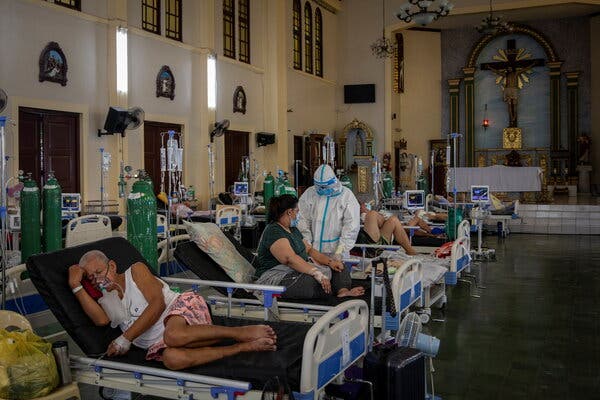
The Philippines’ largest public hospital has been so overwhelmed by a continuous stream of coronavirus patients that it temporarily stopped accepting patients at its emergency room on Tuesday.
The Philippine General Hospital’s decision came a day after the health department reported 18,332 new cases on Monday, a new daily high for the country. On Tuesday, 12,067 were recorded, with the country’s total number of reported cases exceeding 1.8 million.
“We ask for your understanding,” the hospital said in its in a statement. It said more than 100 of its 230 Covid-19 patients were in intensive care and needing high-flow oxygen and ventilators.
It said admitting more patients at this stage would place both patients and hospital workers in danger.
The hospital serves more than half a million patients a year, providing health care services to majority of the country’s poor.
Hospitals designated for Covid-19 have been reporting high caseloads since the beginning of August, fueled by the more infectious Delta variant.
The government said on Monday that it had detected 466 new cases of the Delta variant, bringing to 1,273 the total number of those known to be infected with this variant. It had also detected community transmissions of Delta in the capital, Manila.
On Tuesday, the presidential spokesman Harry Roque again appealed to the public to have themselves vaccinated as more shots arrive in the country.
“While cases are going up, it is true that we are now in the critical warning stage,” Mr. Roque told an online press forum, adding that the intensive care unit beds available in Manila were now nearly full.
“72 percent of all I.C.U. beds in Metro Manila are now in use,” he said, adding that the same trend was happening nationwide, with nearly half of available ventilators also in use. “It is understandable given the Delta variant, but we need to increase the use of masks, to wash hands and if possible, get vaccinated.”
In other news from around the globe:
-
Greece announced new measures meant to push more people to get vaccinated and to head off a renewed spike in infections from the Delta variant. Among them: People who have neither been vaccinated nor show proof that they recovered from a Covid-19 infection will be barred from barred from restaurants, cafes, clubs and sporting venues, the country’s health minister announced. Unvaccinated workers, especially in the tourism industry, will have to undergo frequent testing at their own expense, paying 10 euros ($12) a test — a sizable amount in a country where the average worker earns about $1,300, a month. About 52 percent of Greece’s population has been vaccinated so far. The new measures take effect Sept. 13.
-
The health watchdog in France has recommended a third vaccine dose for immunocompromised people and those 65 or older. They will be eligible for the booster shot beginning in September, but must be at least six months away from their last vaccination. New reported cases in the country are averaging more than 20,000 daily, but have been falling in recent days. The United States and Israel are already implementing booster vaccination campaigns.
Léontine Gallois and Niki Kitsantonis contributed reporting.
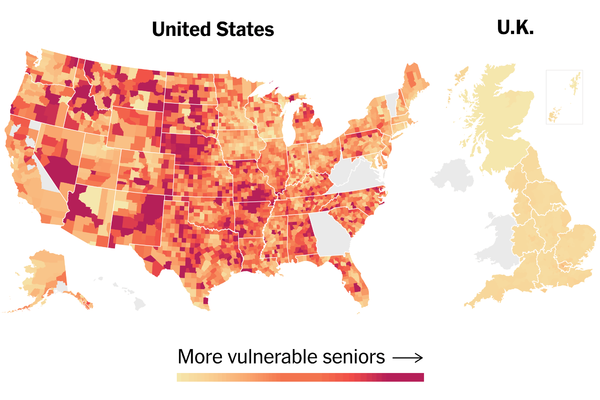
The United States has a far higher share of seniors without full vaccine protection than many other wealthy countries, a key risk factor driving serious Covid-19 illness and death, a Times analysis shows.
As the Delta variant has torn across the country, America’s pace of vaccinations has sped up after months of relative stagnation, and full federal approval of the Pfizer vaccine on Monday could extend that momentum. Just over half of Americans are now fully vaccinated.
But national averages mask the high rate of older Americans who remain deeply vulnerable. Older people still account for most Covid-19 deaths, and in many counties, especially in the South and Mountain West, seniors without full vaccination make up more than 10 percent of the total population.
“We have swaths of populations in counties who are healthy Americans, over 60, who are not vaccinated,” said Claire Hannan, executive director of the Association of Immunization Managers. “These people are at extreme risk, and they don’t realize it.”